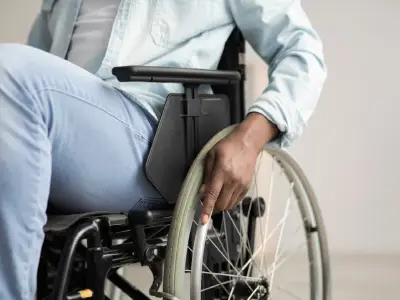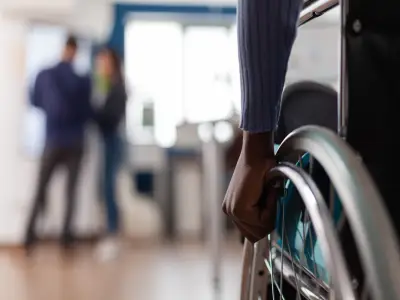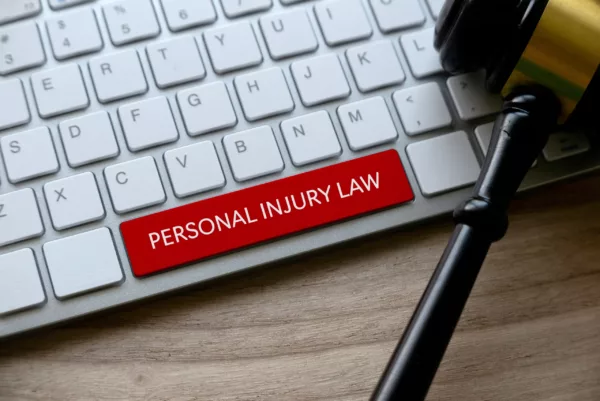Being paralyzed is a terrifying experience because this type of serious personal injury can have long-term, debilitating consequences. Some paralysis cases are particularly severe, resulting in a permanent inability to move or control a portion of the body.
In general, spinal cord or nerve damage can result in paralysis. Whether the injury is permanent or temporary, the victim may need to make significant changes in their personal or professional life.
The medical and lifestyle costs associated with paralysis can be enormous. And if the negligence or wrongdoing of another caused the injury, you must retain the legal services of our talented Wheeling paralysis attorney to fight for compensation in civil courts.
Our attorneys at Ghaphery Law Offices, PLLC, are one of the Wheeling area’s leading personal injury attorneys, with professional, comprehensive, and aggressive legal strategies to ensure that the responsible party(s) are held accountable for their actions.
Call our personal injury law office today to discuss your case.
Why Do I Need a Paralysis Attorney in West Virginia?
Taking care of one’s medical needs is critical after suffering a severe injury resulting in paralysis. By consulting with and hiring our experienced Wheeling paralysis attorney, all aspects of your case will be handled so you can concentrate on your health.
Our skilled accident lawyer in Wheeling, WV, can investigate your case, determine who is liable, gather evidence and records, and calculate any damages that can be recovered. We will communicate with insurance companies on your behalf and provide them with any required paperwork.
If a fair and complete settlement cannot be reached, we may file a lawsuit to advocate for your right to compensation in court.
What is a Paralysis Injury?
 The loss of muscle function in certain parts of the body is referred to as paralysis. Paralysis disables muscles throughout your body, limiting your mobility and bodily functions. It effectively disables a person, either temporarily or permanently.
The loss of muscle function in certain parts of the body is referred to as paralysis. Paralysis disables muscles throughout your body, limiting your mobility and bodily functions. It effectively disables a person, either temporarily or permanently.
When the spinal cord is damaged, sensory and motor signals cannot travel between the muscles below the point of injury and the brain. The muscles and the brain cannot communicate with one another, resulting in partial or complete paralysis, depending on the severity of the injury.
Paralysis can manifest as quadriplegia (loss of function in all four extremities) or paraplegia (loss of function in the lower limbs). Because of the severity of their condition, paralyzed people frequently require extensive medical treatment and care, specialized equipment, and home and workplace modifications to cope with the limitations and changes caused by their injuries.
What Are the Different Types of Paralysis as Defined by the Limbs Affected?
General forms of paralysis include the following conditions. They are frequently linked to which part of the spinal cord or brain has been damaged.
- Monoplegia. A single limb, such as an arm or a leg, is affected.
- Hemiplegia. One side of the body is affected.
- Diplegia. Affects the same limb or area of the body on both sides.
- Paraplegia. Affects both legs and is also known as “paralysis from the waist down.”
- Quadriplegia (Also Known as Tetraplegia). Affects both arms and legs, as well as everything from the neck down in some cases.
- Locked-in-Syndrome. Affects all motor systems except for the eyes. Locked-in syndrome is a relatively uncommon neurological condition.
What Are the Different Types of Paralysis as Defined by the Area of the Spinal Cord That Has Been Injured?
- Sacral Spinal Cord (S1 to S5). Injury to the spinal cord’s base.
- Lumbar Spinal Cord (L1 to L5). Spinal cord injury in the lower half.
- Lower Thoracic Spinal Cord (T6 to T12). Spinal cord injury in the lower middle.
- Upper Thoracic Spinal Cord (T1 to T5). Spinal cord injury in the upper middle.
- Cervical Spinal Cord (C1 to C8). Upper spinal cord injury.
What Are the Different Types of Paralysis Defined by the Nature of the Paralysis?
- Partial or Incomplete. The affected muscle groups retain some motor control. Paresis is another term for this type of paralysis.
- Complete. Motor control is completely lost in the affected muscle groups.
- Localized. Motor control loss occurs only in specific areas, such as the hands or the face.
- General. Paralysis is widespread.
- Permanent. Motor control in the affected muscle groups is permanently lost.
- Temporary. Motor control is temporarily lost in the affected areas.
- Flaccid. Muscles affected weaken, shrink, and become “flabby.”
- Spastic. Muscles that have been affected become tight, tense, and hard. Twitching or spasm of muscles is possible.
What Are the Different Causes of Paralysis Injuries?
Cerebral palsy, particularly monoplegia, is the most common cause of paralysis attacks. People with cerebral palsy frequently have one or more limbs paralyzed due to the unfortunate and cruel disease, and little can be done to help them.
If you have a spinal cord injury, seek medical attention right away. Other possible causes of paralysis are listed below.
- Strokes
- Injuries or Diseases That Cause Nerve Damage
- Nerve Impingement
- Motor Neuron Injury
- Injuries to the Brain
- Impacted or Severed Nerves
What Are the Different Accidents That Can Cause Paralysis?
Paralysis is the inability to move one or more muscles in the body. This happens because the brain cannot send messages to the affected body parts. Strokes, spinal cord injury, brain injury, or disease can all cause paralysis. In some cases, paralysis can be caused by the following:
- Car Accidents
- Workplace Accidents
- Slip and Fall Incidents
- Sports-Related Incidents
- Products With Defects
Our skilled Wheeling personal injury attorney will look into how your paralysis injury occurred. We will be particularly interested in what went wrong to cause the injury.
How to Take Legal Action Following Your Paralysis Injury?
If you were injured in an accident and became disabled or paralyzed, you may be able to file a personal injury claim to recover compensation. The following are the basic elements of a personal injury claim for paralysis injuries:
Proof of Duty of Care
The duty of care varies depending on the accident’s context and nature. A driver’s duty to obey traffic laws, an employer’s duty to adhere to federal workplace safety standards, and medical standards of care are all examples of duty of care.
Breach of Duty of Care
The plaintiff (injured victim) must demonstrate that the duty of care was violated. Running a stop sign, preventable surgical errors, and employers failing to provide adequate health and safety training for employees are all examples of breaches of duty of care.
Evidence of Injury
Plaintiffs must be able to demonstrate that they have been injured. Photos and medical records can be used to prove an injury.
Causal Link to Injury
The last and most important requirement for all personal injury claims is proof that the defendant’s (liable party’s) breach of duty of care caused the plaintiff’s injury.
You may recover monetary compensation for various damages by filing a claim, including medical expenses, physical therapy, lost wages, medication, loss of earning capacity, and mental anguish and pain. Liability for paralysis injuries is determined by the nature of the injury and how it occurred.
If you were injured in a car accident, the at-fault driver might be held liable if the accident was caused by their own reckless or negligent behavior. If you suffered a paralysis injury at work, your employer might be liable for damages if the accident was caused by unsafe working conditions or another example of the employer’s negligence.
Can I Pursue a Paralysis Injuries Claim After an Accident in West Virginia?
Accidents are usually the result of carelessness. You can file a claim or a lawsuit against the person or entity you believe is to blame for your injuries and paralysis. With the help of our knowledgeable Wheeling paralysis attorney, you can seek compensation and damages for your injuries if you can prove the defendant’s liability.
Current and Future Medical Treatment Bills
Your medical expenses can range from an emergency room visit to diagnostic testing, physical therapy, prescription medication, surgical procedure costs, and long-term care facilities. The costs will vary depending on the severity of your paralysis injury.
Medical bills, as well as the cost of arranging for assistive devices and other long-term care items, as well as rehabilitation and therapy, can be substantial. You can also file a claim for future medical expenses and treatment.
Job Loss and Future Earning Potential
Because of the severity of the injuries, the victim may be unable to return to work for an extended period. Loss of movement, even in one limb, can impair a person’s ability to work to their full potential. Furthermore, the recovery time for paralyzed patients is so long that the victim may not be able to return to work for months.
Employers may be forced to replace the employee. Because of permanent paralysis, some people may be unable to work in the same capacity. They may never be able to work in the same capacity again and may never earn the same salary. You can sue the at-fault party for lost wages, lost future income, and loss of future earning capacity.
Pain and Suffering
The pain and suffering may include a loss of quality of life, the inability to perform basic chores and daily life activities on your own, mental anguish, and feelings of helplessness and frustration, which can lead to depression and other mental issues.
Renovations and Accommodations for One’s Home and Vehicle
Home modifications and renovations can help paralyzed patients make their homes more accessible and comfortable. This can include building ramps, grab bars, sliding doors, and easier door knobs. The victim may also require vehicle accommodation to board and disembark from their vehicle.
Can I File a Claim for Wrongful Death as a Result of Paralysis?
A variety of paralysis complications can be fatal. Paralysis can weaken the immune system, increasing the risk of infection. As a result, post-operative infections are common in paralyzed surgical patients. An infection can be fatal in people who have a weakened immune system.
People who are partially or completely paralyzed are also vulnerable to embolisms. An embolism occurs when a blood clot obstructs a lung or heart artery, preventing blood from flowing. Pulmonary and cardiac embolisms are not always obvious. When a doctor notices the embolism, it may be too late to avoid serious or fatal consequences.
If someone died due to someone else’s negligence, the party at fault might be held liable for their injuries. In such cases, the victim’s family may sue for wrongful death. According to West Virginia law, a wrongful death lawsuit must be filed within two years of death.
Failure to file a wrongful death lawsuit within that period may result in losing all rights to any potential wrongful death claim.
Our Wheeling Paralysis Attorney Are Always Prepared to Protect Your Legal Rights
Contact the legal team at Ghaphery Law Offices, PLLC, if you suffered a catastrophic injury through no fault of your own. Our skilled Wheeling paralysis attorney can advise you on your legal options, investigate your claim, establish negligence, and obtain documentation of your injuries and lost wages.
We have successfully served numerous clients and assisted them in recovering financial compensation for damages, both financial and otherwise. If you’re ready to receive justice, call our personal injury lawyer for legal advice on your case!




